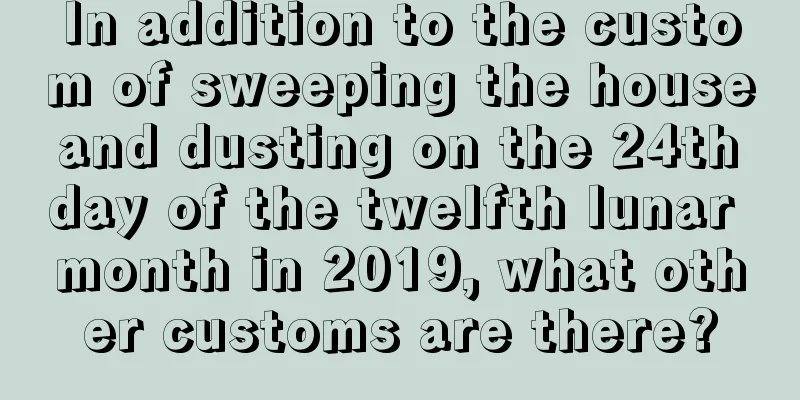In addition to the custom of sweeping the house and dusting on the 24th day of the twelfth lunar month in 2019, what other customs are there?

In addition to the custom of sweeping the house and dusting on the 24th day of the twelfth lunar month in 2019, what other customs are there? Before the Chinese New Year, people always pay attention to cleaning their homes thoroughly to get rid of the old and welcome the new. The twelfth month of the lunar calendar is commonly known as La Yue. Come to Shui Mo Xiansheng's website to learn about the relevant content of the twelfth month of the lunar calendar in 2018!Dust-sweeping customs on the 24th day of the twelfth lunar month in 2019There is a proverb circulating in the southwest of Shandong Province: "Three are for worshiping the kitchen god, four are for sweeping the house, five are for chopping tofu, six are for slaughtering pigs, seven are for slaughtering chickens, eight are for making puff pastry, nine are for ping-pong, and ten are for pinching dumplings." Translated, it means: On the 23rd day of the twelfth lunar month, worship the kitchen god; on the 24th day of the twelfth lunar month, sweep the house; on the 25th day of the twelfth lunar month, chop tofu; on the 26th day of the twelfth lunar month, kill pigs; on the 27th day of the twelfth lunar month, kill chickens; on the 28th day of the twelfth lunar month, fry crispy vegetables; on the 29th day of the twelfth lunar month, "Bingga"; on the 30th day of the twelfth lunar month, "Niega". The old custom in Tianjin is "On the 23rd, sticky sugar melons are eaten; on the 24th, the house is swept; on the 25th, windows are pasted; on the 26th, meat is stewed; on the 27th, roosters are slaughtered; on the 28th, flour is fermented; on the 29th, things are pasted upside down; and on the 30th, people sit all night." Dust-sweeping day is the 24th day of the twelfth lunar month. The so-called "dust-sweeping" is the year-end cleaning, when every household sweeps away cobwebs and dust and washes. According to Lüshi Chunqiu, the custom of sweeping the house during the Spring Festival has existed in China since the Yao and Shun era. According to Chinese folk saying: because "dust" and "old" are homophones, sweeping the dust during the New Year has the meaning of "getting rid of the old and bringing in the new", and its purpose is to sweep away all the "bad luck" and "bad luck". This custom embodies people's desire to break the old and establish the new and their prayers to bid farewell to the old and welcome the new. Sweeping the house also means driving away disease and praying for good health in the new year. This custom sends people a signal of the busy atmosphere of the New Year. This custom reflects the Chinese people's tradition of loving cleanliness and hygiene, embodies people's good expectations, and still maintains tenacious vitality today.What customs are there on the 24th day of the twelfth lunar month in 2019?Pasting Spring Festival Couplets <br /> By the 24th day of the twelfth lunar month, it is already very close to the Chinese New Year. After dusting, it is time to put up new decorations to welcome the New Year. Posting Spring Festival couplets is one of them. Spring Festival couplets evolved from "peach stems" during the Warring States Period more than two thousand years ago. During the Spring Festival, Meng Chang, the emperor of the Later Shu Dynasty in the Five Dynasties, had a sudden inspiration and ordered people to cut peach tree slices. He picked up a pen and wrote a couplet on them: "The New Year brings us more blessings, and the festival is called Changchun." This is the earliest Spring Festival couplet in China. After Zhu Yuanzhang, the founding emperor of the Ming Dynasty, established Nanjing as the capital, he issued an edict on New Year's Eve: "Every family of officials, scholars and common people must write a pair of Spring Festival couplets to decorate the new year." Since then, Spring Festival couplets have been popularized, and to this day, every household will post Spring Festival couplets during the Chinese New Year.Cutting paper-cuts <br /> After cutting paper-cuts, paste them in the freshly cleaned house, adding a lot of New Year's joy to the home. The window paper-cut patterns include various stories about animals, plants, and people, such as magpie climbing on plum tree, peacock playing with peony, lion rolling embroidered ball, three sheep (yang) bringing good luck, two dragons playing with pearls, deer, crane, tung tree and Chinese toon (six directions in harmony), five bats (blessing) holding longevity, rhinoceros looking at the moon, lotus (continuous) years with fish (yu), mandarin ducks playing in water, Liu Hai playing with golden cicada, the two immortals of harmony and unity, etc. Eating Zaotang <br /> Eating Zaotang, Zaotang is a kind of maltose, which is very sticky. When it is drawn into a long stick, it is called "Kanto sugar", and when it is drawn into a flat round shape, it is called "sugar melon". Guandong sugar is also known as Kitchen God sugar and big piece of sugar. It is only sold around the New Year's Eve in a year. Guandong sugar is a sugar product made from malt and millet, and is used to worship the Kitchen God. |
<<: What is the fate of a girl born on the 26th day of the twelfth lunar month in 2019?
Recommend
Is the ninth day of the Lunar New Year in 2021 a good day to get married?
Due to the impact of the epidemic, those who did n...
The origin and meaning of eating rice dumplings during the Dragon Boat Festival. When is the Dragon Boat Festival in 2019?
The Dragon Boat Festival is a traditional Chinese ...
Why do people eat apples on Christmas Eve in China? Are there any taboos or rules?
The day before Christmas is also called Christmas ...
Is today, the sixth day of the second lunar month in 2019, a suitable date in the lunar calendar for shaving a child's head?
Introduction: In traditional Chinese culture, some...
Feng Shui explains the rules and taboos of placing wooden furniture
Introduction: Wooden furniture, as the name sugge...
What day is March 19th in the lunar calendar 2017? National Safety Day?
Introduction: Have you heard of National Security ...
What is the fate of people born in the ninth month of the lunar calendar? Analysis of the twelve zodiac signs born in the ninth month of the lunar calendar!
Introduction: New life is born every month, and pe...
Can I start renovation on September 26, 2018? What is the fortune?
An auspicious day is a saying that everyone knows....
Is it a good idea to pick up a new car on September 26th of the lunar calendar in 2018?
It is the last month of autumn. As we are about t...
Is it a good time to sign contracts on the sixth day of the fourth lunar month in 2020? Pay attention to auspicious and inauspicious matters!
Choose an auspicious day for signing the contract:...
Customs and taboos of visiting graves during Qingming Festival in 2019. Is it okay to visit graves three days before or three days after?
Qingming Festival is a festival for visiting tombs...
Will a baby girl born on the second day of the second lunar month in 2019, when the dragon raises its head, have a good fate?
Will a baby girl born on the second day of the sec...
Is the tenth day of the ninth lunar month in 2018 a suitable date for groundbreaking? What are the taboos for groundbreaking?
Generally, things like starting construction for r...
Analysis of the fate and fortune of a girl born on October 28th of the lunar calendar in 2020!
Introduction: Children born on different days have...
Raising fish is Feng Shui for bringing wealth, but placing the fish tank incorrectly can also cause loss of wealth!
Introduction: Raising fish at home has become a ch...









